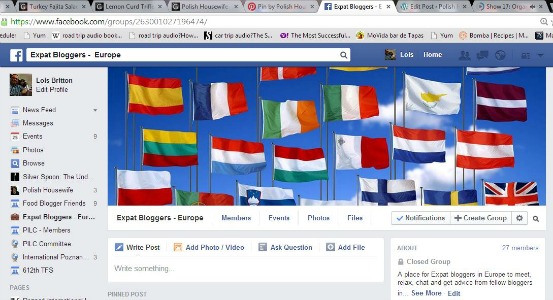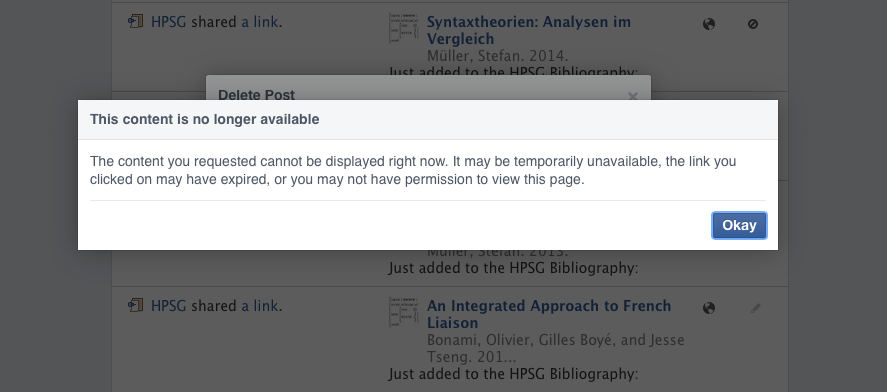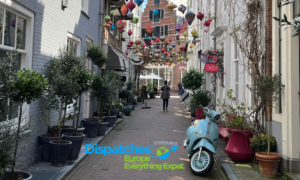Everyone hates Facebook and social media. But no one cuts the cord to Facebook and social media because how else are you going to communicate instantly with two billion other humans around the globe?
 That’s the conundrum for everyone, but especially for expats. And for expat-focused media companies such as Dispatches Europe.
That’s the conundrum for everyone, but especially for expats. And for expat-focused media companies such as Dispatches Europe.
As with many businesses, Dispatches seeks to connect with public expat Facebook communities because they have a lot of potential viewers. But increasingly, expat news websites such as ours are banned from posting what we believe is valuable content that actually helps build those online groups.
Before I get too wrapped up in rhetoric, let me explain my side of this issue, and we’d certainly love to hear yours.
Our side:
We’re a startup media company. But we have a growing audience, and often Dispatches readers post our content on expat Facebook groups. Which we love because we’re a media company and media companies need eyeballs.
But when we post that same content directly on public Facebook pages – and I’m talking about primary-source journalism such as travel posts, tech news or our Expat Essentials – we get banned by moderators as spammers. Go figure ….
Here’s the deal: A few years ago, expats across Europe discovered they could create instant support groups with Facebook communities. Sell stuff they no longer wanted. Find babysitters or get visa advice. For “free.”
Next thing you know, there are hundreds of public expat Facebook groups in every city across Europe catering to every flavor of expat from female entrepreneurs to expat spouses to highly skilled internationals searching for career opportunities.
True to human nature, everybody wants to rule the world, or at least these increasingly influential SM fiefdoms. I’m pretty sure as soon as the first person posted on the first expat FB page, there was a disagreement over content. This is done in the name of maintaining a forum for expats to meet and exchange info without being targeted by used-car salesmen.
I get that.
Is news spam?
Now, many FB group moderators try to keep the chaos to a dull roar by keeping the content “pure and organic,” as I read on one’s rules pinned to the top of the page. No ads, no promotional posts. Somehow, those English comedy nights and pilates studios always seem to be exempt.
Which brings us to Dispatches’ dilemma: We just got kicked off the Americans in the Netherlands FB page.
The moderators, Austin and Chris, are super-nice guys who try to be fair. But all moderators are pressured by users, none of whom agree on the validity of content. Dispatches got booted after complaints from two of 415 members. As we say in the analytics biz, a bit of a flawed sampling. And we didn’t get kicked out for anything we posted. These members were worried about what we might post.

From the moderators:
Hey Terry, hope you are well. We received two messages from two members asking that you don’t use posts about their tax information or struggles or anything of that nature for a future dispatches article. Basically, they both stated that they felt this was a private arena rather than a public one like Dispatches. Whatever you decide to do, please don’t use their names or any names from the group. Hope you will understand this and again we are just relaying the messages. Take care and have a nice weekend!
This is a totally reasonable request.
Ah, no.
One of the biggest misconceptions about social media is that FB users mistake “closed” groups for private groups. Yes, curators try to weed out spammers and trolls by asking new members if they live in the relevant geographic location and why they want to join the group. They have rules about acceptable posts.
But these closed groups often have 10,000 members.
When you send a letter to your grandma, that’s private. When you crowd-source advice about healthcare providers, visa status or tax problems on a public expat Facebook community with thousands of members, that’s in the public domain. It’s out there, and will always be out there.
Here’s what I sent back:
Thanks guys for inspiring a great post. First, we don’t just pull stuff from public FB pages without making clear we’re gathering information for a post, and why. Second, public FB pages are not private. FB spent a trillion dollars to build the second-largest social media platform in the world behind WeChat. The price for using FB or Dispatches, for that matter, is that yes, the platforms are going to use your data in some manner because when you post, it’s … in the public domain.
We don’t collect information on individuals but we do collect blind analytics. We don’t use URLs, IP addresses or any other identifying data. But if people think FB is “private,” they’re wrong. Social media by its nature is public domain. If people aren’t comfortable with that, they need to go back to writing letters or using some encrypted private messaging to communicate.
FB communities tend to splinter
My personal experience after building Dispatches Europe for two years is that expat FB communities are like churches: Everyone starts out singing from the same hymn book, but pretty soon theological disputes arise about the purity of the platform. Curating an expat FB page seems to bring out the righteousness in people. Pretty soon, the whole power-trip thing kicks, moderators go all arbitrary and capricious trying to enforce vague post guidelines and they start banning people.
Then, as we’ve seen with Foreigners in Vienna and others, the offended parties go off and start their own Facebook community with different rules.
We’ve invested a lot of capital (yes, gasp, we’re capitalists!) to create Dispatches just as Facebook invests billions in everything from basic platform infrastructure to AI. If we have one thing in common, it’s that neither is a philanthropic organization. That, and we need to reach people. A LOT of people.
Leveraging expat Facebook pages is very important to us. We don’t make money through advertising. We generate revenue through complementary businesses such as marcom and consulting. Facebook is the most efficient way to stay abreast of expats issues and trends in careers, housing, tech and travel while building an audience. To get clients, we must prove through analytics that we have catalyzed an audience. It’s just that simple.
In turn, we give away “for free” the costly expat-focused content we pay dozens of journalists to report and post.
What everyone needs to acknowledge on both sides of this debate is, in the 21st century, there’s no such thing as “free” and no such thing as “private” when it comes to the Internet. Whether expat news belongs on expat FB pages … that’s your call.
Let us know what you think at: [email protected]
And let us know if it’s okay to quote you.
Co-CEO of Dispatches Europe. A former military reporter, I'm a serial expat who has lived in France, Turkey, Germany and the Netherlands.















